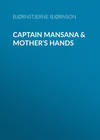Buch lesen: «Captain Mansana & Mother's Hands», Seite 9
PART II
The river cut its way through the landscape in long curves. From the south bow window in the hotel, the mother and daughter followed its course through tangled underwood and birch forest; sometimes it disappeared, and then shone out again, and at last became fully visible. There was a great deal of traffic going on, the hum of it reached their ears.
Down at the station, loaded trucks were being wheeled about. Behind the hotel were the works, the sawmill; smothered thuds and blows were heard, and more faintly the roar of the waterfall; over everything else the shrill sound of the planks as the saw went through them. This was one of the great timber districts; the pine-trees darkened the heights as far as one could see, and that was very far, for the valley was broad and straight.
"Dear, it is nearly seven o'clock. What has become of the horses?"
"I had thought of sleeping here to-night, and not starting till to-morrow morning."
"Sleep here, mother?" She turned towards her mother with a look of surprise.
"I want very much to talk to you this evening."
The daughter recognised in her mother's eyes the same expression she had seen there at the station at Christiania: and she flushed. Then she turned back again into the room.
"Yes, suppose we take a walk." The mother came and put her arm round her neck.
Shortly after they were down by the river. It was between lights, and the softened hues of plain and ridge gave one a feeling of uncertainty.
A perfumed air was wafted from wood and meadow, and the rush of the river rose fiercely to their ears.
"It was of your father I wished to speak."
"My father?"
The daughter tried to stop her, but the mother went on.
"It was here I first saw him. Did you never hear his name mentioned in Christiania?"
"No." A tolerably long silence followed the "No."
"If I have never spoken of him freely, I had my reasons, Magne. You shall hear them now. For now I can tell you everything; I have not been able to do so before."
She waited for the daughter to make some rejoinder; but she made none.
The mother turned half round and pointed up towards the station, that is, towards the house which stood beside it.
"Can you see that broad roof there, to the right of the hotel? There are the assembly rooms, the library, and the rest. Your father has the credit of it; he gave all the timber. Well, it was there I first saw him, or rather from there I first saw him. I sat among the people who were going to hear him; the whole of the ground-floor is one single room with broad sloping galleries, and it is built after the American fashion; you know that your father went over there when he had finished his studies. Come, now, let us go on farther; I love this path by the riverside. I walked along it with your father just six weeks to the hour and day after I had first seen him, and by that time we were married."
"I know."
"You also know that I was maid of honour to the Queen when I came here. She intended going farther out towards the fjord, but first we were to spend a few days here among the mountains.
"We came here one Saturday afternoon (as you and I have to-day) and remained over Sunday. There was a great crowd of people on Sunday to see the Queen; they knew she was to go to church. In the afternoon they all thronged to the assembly rooms to hear your father speak. I had seen the announcement of it in the hotel. The Queen read it too; I stood at her side and said, 'I do so terribly want to go.' 'Yes, go,' she answered, 'but you must be escorted by one of the gentlemen-in-waiting.' 'Here among the peasants!' I asked, and I took measures to go alone.
"I found a seat under the gallery, but near a large window, from which I could see a long way down the road. And as Karl Mander didn't come at the right time (he very seldom did) all necks were stretched to get a glimpse of him on the road; so I saw that he was to come from that direction. I looked, too, with the rest, and a long way off there were three men visible, walking arm-in-arm, one tall and two smaller, the tallest in the middle. I have very good sight, and thought at once that he could not be one of those, for they had been having too festive a time. They happened to stand still just at the moment, then they came along wavering, first to the right, then to the left. People began to whisper and titter. As the three drew nearer I felt instinctively that the tall one was Karl Mander, and felt ashamed."
"Was he drunk?"
"Yes, he was, and the others as well; and very drunk too, both the doctor and the lawyer; and the worst of it was, they were neither of them his friends or partisans. It was a trick they had played on him, for that was what people were in the habit of doing. They had undertaken to make him drunk; but they had become still more drunk themselves."
"How horrible, mother!" She wanted to stop; but the mother went on.
"Yes. I had read all kinds of things about Karl Mander—but it was a different thing to see him."
"Were you not afraid?"
"Yes. It was disgusting. But when they came near enough for me to distinguish their faces, and all the people in the crowd who could see them laughed aloud, I shook off my fear; and when they came quite close, Karl Mander appeared to me such a marvel that I absolutely delighted in him. I admit it."
"How a marvel?"
"He was the embodiment of beaming joy! Picture a whole brigade of cavalry in the maddest gallop, you would not get such a sense of exuberant delight! The powerful figure with the mighty head held these two little men, one under each arm, as though he were dragging along two poachers. And as he did so he laughed and shouted like a boisterous child. He looked as kindly and gladsome as the longest day in the year up at the North Pole. As for the others who had set themselves to make him tipsy—for, as I have told you, it was the fashionable amusement at that time to make Karl Mander drunk—he brought them alongside in triumph. He was tremendously proud of it. He was tall and broad-shouldered, in his light checked woollen suit, which was very thin and fine; for he could not endure heat, he was foremost among the worshippers of cold water, and bathed in it, even when he had to break the ice. He held his hat, which was a soft one and could be folded up, in his left hand. That was how he was always seen; he never wore his hat at home, and out of doors he carried it in his hand.
"A great bushy head of hair, extraordinarily thick and brown; which at this moment was falling over the lofty brow—(yes, your brow is like his)—and then the beard! I have never seen so beautiful a beard. It was of a light colour and very thick, but the chief peculiarity of it was its delicate curliness. It was positively beautiful in itself—as a beard seldom is.
"And then those deep shining eyes—yours are something like them—and the clearly cut curve of the nose! He was a gentleman."
"Was he?"
"Heaven! haven't I managed to give you that impression?"
"Yes, yes—but others have–" She was silent, and the mother paused.
"Magne! I have not been able, I have not wished, to shield you from all this. As long as you were a child, a young girl, I could not explain everything to you exactly as it was. It would also have led you to try to defend that which you had not yet the power to defend, and that would have done you harm. And there was something else besides.
"But now you shall know it. Since your childhood I have never given you any advice which did not come from your father. You never saw him, but all the same I can say that you have never seen nor heard anything but him. Through me, you understand!"
"How so, mother?"
"Well, we are coming to that. Now I must make you understand how I came to marry him."
"Yes, dear!"
"He stood there on the platform and drank down water, glass after glass. He drank the entire contents of the water-bottle and called for more. The people laughed, and he laughed. He held the water-bottle and glass in a drunken grasp, and he looked up and round him, as though he was not properly conscious of himself or of us. And he laughed. But through it all I saw the godlike in him.
"A free man's open, joyous spirit, dear; unruffled self-reliance in reaching out for that which he needed. You should have seen his firm, capable hands, hardened by toil. And his face—the face of a man who overflows with all good gifts."
"What did people say?"
"They knew him, they were only amused. And he was amused. When he began to speak he had his tongue completely under control. It seemed to me that the voice was unnatural, it sounded as though it came from inward depths. But it was his natural voice. He had hardly begun when something happened. A crowd of ladies and gentlemen strolled by, among them some of the Queen's suite. We could see them from our place near the window, and he saw them too; we saw that they pointed in.
"He stopped short, turned quite pale, and drew a breath so deep that we all heard it. Then he drank more water. It was long before he could go on speaking. They all looked at him, some whispered among themselves. Up to now he had spoken like a great machine which gives the first irregular beats with pauses between. But now he rose, and when he began to speak again he was sober. I tell you he was absolutely sober. Let me tell you by degrees, or you won't understand.
"His speech—do you know to what it can be compared? A fugue of Bach's. There was something fulminating but abundant, uninterruptedly abundant, and often so gentle; but there was this great difference, that he often groped for a word, changed it, altered it again, and yet it was incessant, and reverberant in spite of it all—that was the wonderful part of it. An irresistible reckless eagerness and haste. One wondered if there could be more, and there was always more, and nearly always something extraordinary.
"I had often heard people described as being possessed by some force of nature, but I had never seen it. Least of all at the Court, where marked personality is rare. I was at last face to face with one. The man who stood there was obliged to speak—in the same way, probably, as at a generous table he was obliged to drink. I knew that he managed his two farms, and worked on them himself when he had time, and I imagined that I could see the giant finding relaxation in the work; but I saw clearly that his mind would work on as actively all the same, and that head and hands would vie with each other which should weary first.
"It was of work that he spoke. He led off by a reference to the Queen.
"'Who is she?' he asked; then he answered with some kindly feeling words about her. Then he asked again: 'Who is she?' He replied with another inquiry: 'Does she earn her own bread?'
"This he held was the first obligation of all grown-up human beings who had the power to do it. That was the first standard we should apply to one another.
"'Does she earn her own bread? Do those who are in her suite earn theirs?'
"'No,' he answered, 'they don't earn it. They live on that which others have earned, and are earning.
"'What do they do? Brain work? No, they live by the brain work of others. How do they spend their days then?
"'In enjoyment, mental and bodily enjoyment of that which others have done and are doing. In luxury, in idleness, in social formalities, in king-worship, in travelling, in repose do they live.' At this point he kept on substituting one word for another, but made no pause.
"Their greatest exertion, he said, was to try to enjoy an additional party or an extra levee, their greatest danger was a cold or an overtaxed digestion.
"And in order that the fruit of other people's labour should not be taken from them, what did they do?
"They opposed everything which threatened them with a new order of things. They opposed all needful changes. They opposed emancipation for those who had nothing in the world. They behaved as though society had from eternity been ordained for them, as though they could say 'Thus far and no farther.'
"You will understand that I have learnt all these ideas from my intercourse with him. I could after my own fashion make all his speeches, and that more fluently; but I believe that this exchanging one word for another, and his perpetually halting over it, made the words that he finally did choose more significant. For my part, I have written down everything that happened in our short life together."
"Everything?"
"I mean everything that mattered at all. Everything, everything. He never wrote a line, he said he had no time, he despised it. And when death took him from me and from us all, what had I better to do? No—don't interrupt me—let me go on telling you! He repeated the same thought from the religious point of view. It was his way to look at the same idea from every side. He said that to-day he had been to see an old woman who said that she couldn't go to church because she had no shoes. There was no end of trouble to get her some, for the two shoe-shops wouldn't sell any on Sunday, but she got them. He saw her afterwards go to church, just at the same time as the Queen and her suite.
"And he thought, there are so many who sit in church with wretched shoes on, and so many at home, who dare not venture to church because of their miserable shoes, or the rest of their miserable garments. Who are they who have such wretched shoes and clothing? They who have worked most, worked until they are broken with toil.
"But those who have not worked have ten pairs of shoes, they could have a thousand; and clothes too, in the greatest superfluity. He had not been to church, he said, but he knew that there they held forth as though it were the most natural thing in the world that those who had shoes should give them to those who had none. You would gather from the preaching that Jesus Himself had taught it, Jesus had come to make all men happy, and this was the best way! For it is written, 'He went about doing good.'
"But they all went home from church just as they came; and no exchange of shoes took place, nor exchange of clothing either. One went back to his superfluity of leisure, the other to his poverty and want, and those who had not been able to go at all, because they were too poor, remained after the service as they had been before it.
"Such, you see, is our Christianity, he said. And he had a right to speak, I can tell you, because he shared his 'superfluity' with others."
"But still you live in a certain comfort?"
"Yes, in his opinion every one had a right to do so. The man who recognised that he was called on to sacrifice his comfort also should do it; but for most educated people comfort was the indispensable condition of work and help the foundation of happiness. And there was a charm of beauty about it, too, which is a rare incentive.
"No, what he demanded was that all those who could should support themselves—hear that, my daughter!—and that those who had superfluity should employ it in work which should be fruitful for others. He called that Church cowardly and shameless which did not make that demand without respect of persons."
"Like Tolstoï, then?"
"No, they were very different. Tolstoï is a Slav by birth, Ivan the Terrible and Tolstoï both of them; for these contradictions pre-suppose each other. The one did everything by force, the other resists nothing. The one had to crush all wills under his own in order to make room for himself, the other will willingly yield, knowing that a desire, once satisfied, dies. The Slav impulse towards tyranny, the Slav impulse towards martyrdom, the same passionate excess in both. Born of the same people, and under the same conditions.
"All the freedom we in Western Europe enjoy we have attained by keeping bounds, not for ourselves alone but for others. And also by resisting. It is weakness that knows no limits: strength ordains limits and observes them."
"But yet the Bible teaches–"
"Yes, yes, but the Bible is from the East too; the Westerns act in opposition to the Bible. What I am saying comes from your father."
"Did he know Tolstoï?"
"No, but what I have been saying is older than either the Bible or Tolstoï."
"Then he was a great orator?"
"That I could hardly venture to call him; he could not be reckoned among the prophets, but among the seers.
"Now don't interrupt me. He believed that in another hundred years to live in idleness and superfluity would be looked upon by most people as now we look upon a life of fraud and crime."
"Oh, mother, how did you feel about it?"
"His voice seemed to surge and vibrate in my ears both day and night. A storm-cloud seemed to surround me. Not as though he thundered or commanded. No, it was his personality, and something in the voice itself. It was deep and restrained, as though from a cavern; it came fitfully, but without cessation. I believe he spoke for over two hours. Whomever he happened to look at looked at him, and if he looked away the other continued to gaze—he couldn't help it, you understand. His eyes blazed with inward fire, he stood bending forward like a tree on a hillside. The image of the forest rose in my mind. Later, when I was nearer to him, the breath of the forest seemed to hang round him. And his skin was so clear! For instance, that part of his throat which was not sunburnt, because he stooped. When he lifted his head, you can't imagine how pure and fair it was.
"Ah, how have I drifted into this train of thought? But never mind, I have drifted into it—and I will follow it out—it takes me to your father's side again! O Magne, how I loved him! how I shall always love him!" She burst into tears—the girl's heart beat against hers. The softened colours of wood and plain in the uncertain light, the strenuous roar of the river seemed to sunder them from each other; the surroundings were at war with their mood; but the more closely did they cling together, each supporting the other.
"Magne, you mustn't ask me to put what I have to say to you in any sort of order. I only know the point I am aiming at.
"Yes, he was like the nature that surrounded him, fashioned on a generous scale and rich with hidden treasures: so much I dimly grasped. Everything I saw was new to me, the face of nature as well as the rest. I had travelled, but not in Norway.
"It is said of us women that we are not able to analyse those whom we love, but only worship them in the abstract. But he had a friend, his best friend; he could analyse him; the poet. He was present at Karl Mander's last meeting, and he came to me from it when your father was dead. We talked together of everything as much as I then could. He wrote about him the most beautiful things that have ever been written. I know them by heart; I know everything by heart that has been worthily written about your father."
"Do you know what it was he wrote?"
"'If the landscape I see around me could speak like a human being; if the dark lofty ridge could find speech to answer the river, and those two began to talk across the underwood, then you would know the impression made when Karl Mander had spoken so long that the vibration of his deep voice and the thoughts it uttered had melted into one.
"'Halting and with difficulty, as though from inward depths clumsily fumbling for words, he always arrived at the same goal. The thought was at last as clear and lucid as a birch leaf held against the sunlight.'"
"Was it then–"
"No, don't interrupt me! 'Karl Mander often seemed to me as unlike all other people as though he belonged to a different order of things. He was not like an individual, he represented a race. He swept by like a mighty river: at the mercy of chance and natural obstacles, perhaps, but ever rolling on. So was he, both in life and in speech. Neither was his voice merely individual, it had in it the reverberation of a torrent—a melancholy, captivating harmony, but monotonous, unceasing.'"
"That surely is what the sea sounds like, mother?"
The mother was as much carried away by her memories as animated in her movements, as eager in her glance as a young girl. Now she stopped.
"Like the sea, do you say? No, no, no, not like the sea. The sea is only an eye. No, dear, not like the sea; there were warm depths and hiding-places in his nature such as the sea has not. One had a sense of intimate security and comfort with him. He was capable of the most self-forgetting devotion. Listen further. 'Karl Mander was chosen,' he wrote, 'chosen as a forerunner before the people's own time should come—chosen because he was good and blameless; his message to futurity was not soiled in his soul.'"
"That is beautiful."
"Child, can you imagine how I was carried away? I had had a vague feeling that the surroundings of my life were unreal; here was something that was real.
"And he himself! We women do not love that which is lofty merely because it is lofty; no, there must be a certain weakness too—something that appeals to our help; we must feel a mission. And you cannot conceive how powerful and yet powerless he was."
"How powerless, mother?"
"Well, when he came—in that condition–"
"Yes, of course."
"And his way of expressing himself. He never found the right words first, he stopped and changed them even as they poured out. And, in the meantime, if he caught something up in his hand he stood there with it. If it were the tumbler—and it generally was—he grasped it tightly, and so, because of it, would keep his hand still for a quarter of an hour at a time. His personality was so pathetically simple, or how shall I express it? He was a seer, not a prophet—yes, I told you that before. But seers are quite different, they don't know themselves so well, they have absolutely no vanity. Heavens, how I longed to go and take off his cuffs! One could see that he was not accustomed to wear them: some one must have told him that it would not do to make a speech from a platform without cuffs on. He had crumpled and tumbled them; they had come unfastened, or perhaps never had been fastened; they got in the way and slipped over his hands. He struggled with them. There was something wrong about the waistcoat too; it was buttoned wrong, I believe, and puckered up at one side, so that it showed one of his braces—to me at any rate, where I sat looking at him sideways and with the light full upon him. Ah, that mighty creature with the stooping head! The tears rose in my eyes. Who would not have been willing to follow him?
"I felt as deeply as it could be felt that he must be helped. I did not know that I was to help him; I only knew that he must be helped and sustained."
A rush of memory so overpowered her that she could not go on, she turned away.



















